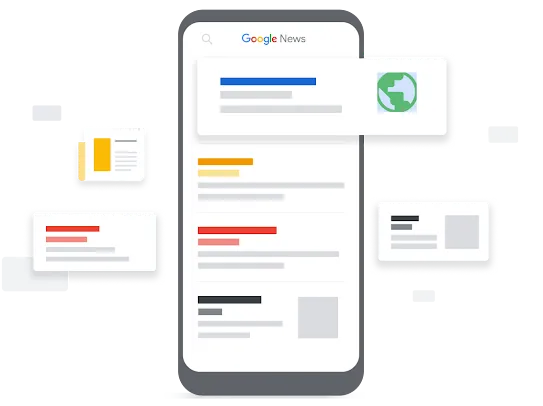Google News Intiative
Google aims to make it easier to stay informed by using technology to organize and help people access information about current issues and events. News experiences across Google are built to help you easily find news from a diversity of trusted sources so you can stay up-to-date and informed on the stories that matter most to you.




Elevating trustworthy sources
Google strives to make it easy for you to find trustworthy information and to know where that information is coming from. Our algorithms are designed to elevate news from expert and authoritative sources, and we require publishers to be transparent about behaviors like site ownership, article authorship, bylines, and more in order to be represented in news results.
Fighting deceptive practices
Our news policies target bad behavior, regardless of political perspective. We do not allow sources that misrepresent themselves with regard to their ownership or primary purpose. This includes sources that misrepresent their country of origin or that work together in ways that mislead users about their editorial relationships or independence.
Relevance
Relevance
Relevance to your search terms is a key factor in determining what you see for query-based experiences like “Top stories” in Google Search. A piece of content is relevant if it has the information you’re looking for. The most basic signal that information is relevant is when an article contains the same keywords as your search, but our algorithms also have more advanced ways to determine relevance.
Location
Location
Where you’re searching from influences which results you see. We use where you are to help you find content relevant to your area, such as the Local section in Google News. If you’re in the United States and you search for “football,” Google will most likely show you results about the American sport, as opposed to other versions of the sport.
Prominence
Prominence
Prominence is a way to identify noteworthy news events. For example, our news algorithms take into account if news sources are heavily covering a particular news story and are featuring that coverage prominently on their sites, if a story has been highly cited by other sources, and if something contains significant original reporting .
Authoritativeness
Authoritativeness
Signals help prioritize high-quality information from the most reliable sources available. To do this, our systems are designed to identify signals that can help determine which pages demonstrate expertise, authoritativeness, and trustworthiness on a given topic . Those signals can include whether other people value the source for similar queries or whether other prominent websites on the subject link to the content.
Freshness
Freshness
Freshness refers to how recently the content was published and how important this is in the context of the subject. When news is happening, our algorithms may determine that a story with up-to-date information is likely more useful than an older one.
Usability
Usability
Usability assesses how easy it is to view content on a site, such as whether the site appears correctly in different browsers; whether it is designed for all device types and sizes, including desktops, tablets, and smartphones; and whether the page loading times work well for users with slow Internet connections. Paywalls have no impact on usability in news on Google.
Interests
Interests
Your interests may help determine results in personalized content experiences such as Discover and the For You tab in Google News. You may see articles that match interests you’ve specified or that we inferred from your past activity on Google products, depending on your activity settings . Our systems do not attempt to rank content based on any political or ideological point of view, nor do they attempt to infer the points of view of our users or of the content we rank.
Ideological or political leanings
Ad sales or commercial relationships
Personal information



An independent and thriving ecosystem of news sources representing diverse perspectives is essential to our mission, and to a well-informed society. We want to ensure not only that users can readily discover a diverse range of authoritative reporting, but that news partners benefit from creating it.
Through programs like the Google News Initiative and Google News Showcase, or products like Journalist Studio and Revenue Reader, we aim to help journalism flourish by helping reporters do their work securely and efficiently, and bring new audiences to publishers.